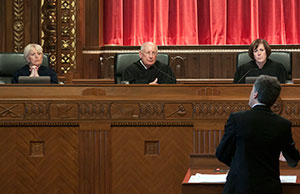City of Cleveland and Occupy Cleveland Protesters to Argue First Amendment Case at Supreme Court
State’s Highest Court to Hear Eight Cases on November 19 and 20

Ohio Supreme Court will review cases from three northeastern Ohio counties on Tuesday and Wednesday.

Ohio Supreme Court will review cases from three northeastern Ohio counties on Tuesday and Wednesday.
During the Ohio Supreme Court’s session on Tuesday, the City of Cleveland will defend a local law requiring people to obtain a permit to remain in Public Square at night. The case pits the city against protesters who participated in 2011 Occupy Cleveland activities in the square and were arrested for refusing to leave the area after 10 p.m.
In City of Cleveland v. Erin McCardle and Leatrice Tolls, two arrested protesters contend that the ordinance’s curfew and permit requirement infringe on their First Amendment rights to free speech and assembly. The language in the law is unconstitutional, the protesters claim, because it requires city officials to consider the content of the speech that may take place when deciding whether to grant a permit. In addition, they assert that the city has not shown it has a compelling interest to prohibit speech on the square between 10 p.m. and 5 a.m.
Attorneys for the city argue that the ordinance is content-neutral and narrowly tailored to advance the government’s significant interests, such as public health, safety, and welfare. They counter that the law is limited in scope, allows people to remain in the square if they simply obtain a permit, and provides “unfettered and completely unrestricted access at all other times of day.”
This case is the last of four scheduled for argument before the court on November 19. The court will hear oral arguments in four more cases on Wednesday, November 20. The court’s session begins at 9 a.m. each day at the Thomas J. Moyer Ohio Judicial Center in Columbus. The arguments will be carried live online at sc.ohio.gov and broadcast live on the Ohio Channel.
Along with the brief descriptions below, the Office of Public Information today released summaries of the eight cases.
Cases for Tuesday, November 19
In addition to McCardle/Tolls, the court will consider three other cases from Cuyahoga County during Tuesday’s session:
- State of Ohio v. Lashawn Amos and Christopher Richmond v. State of Ohio both ask the court whether trial courts must consider a presentence investigation report in a criminal case before sentencing a defendant to community control. The state notes that the appellate court decided these cases on the same day, but seems to have ruled differently on the issue. An Ohio statute and a rule governing criminal cases make presentence reports mandatory before a court can impose a community control sanction, the state asserts.
- In State of Ohio v. Giovanni Manocchio, a Cuyahoga County man convicted of driving under the influence received a lifetime suspension of his driver’s license as part of his sentence. The man sought limited driving privileges nine years later, but the state argues that a statute explaining when certain license suspensions can be modified or terminated bars any change to a lifetime suspension until 15 years after it begins.
Cases for Wednesday, November 20
The court also will hear the following four cases on Wednesday:
- Children’s Hospital Medical Center of Akron v. Seth Niles Cromer is a medical malpractice case that arose after the 2007 death of a 5-year-old boy in an Akron medical center. The case turns on whether a certain type of instruction regarding standard of care was appropriately given to the jury. The hospital contends that the appellate court’s decision wrongly prevents trial courts from giving juries helpful guidance about how to determine whether a medical defendant has committed negligence.
- Summa Health System Akron City Hospital et al. v. Theresa Hayward also involves a dispute about jury instructions in a case in which a woman developed nerve damage after abdominal surgery and sued claiming negligence. The health system argues that, even though the jury found no negligence, the appellate court redefined what constitutes prejudicial error when it determined that a particular jury instruction should not have been given.
- In First Resolution Investment Corp., et al. v. Sandra J. Taylor Jarvis, a debt collection company is seeking nearly $9,000 in credit card debt plus more than $7,000 in interest from a Cuyahoga Falls woman. The collection agency asserts that the claim arose in Ohio because the woman is a resident here so Ohio laws apply, that the breach of her credit card agreement occurred on the date she last made a minimum payment, and that it can assess an interest rate on the overdue amount based on the card’s rate.
- Corrine Codeluppi v. State of Ohio is an appeal from a woman convicted for driving while intoxicated who is challenging the trial court’s rejection of her request to suppress certain evidence. She claims that her motion met the required legal standards for a hearing on the issue, but the appellate court, in affirming the trial court’s ruling, incorrectly applied more stringent standards than other courts have and demanded a higher burden than the Ohio Supreme Court has ruled is warranted to grant such motions.


